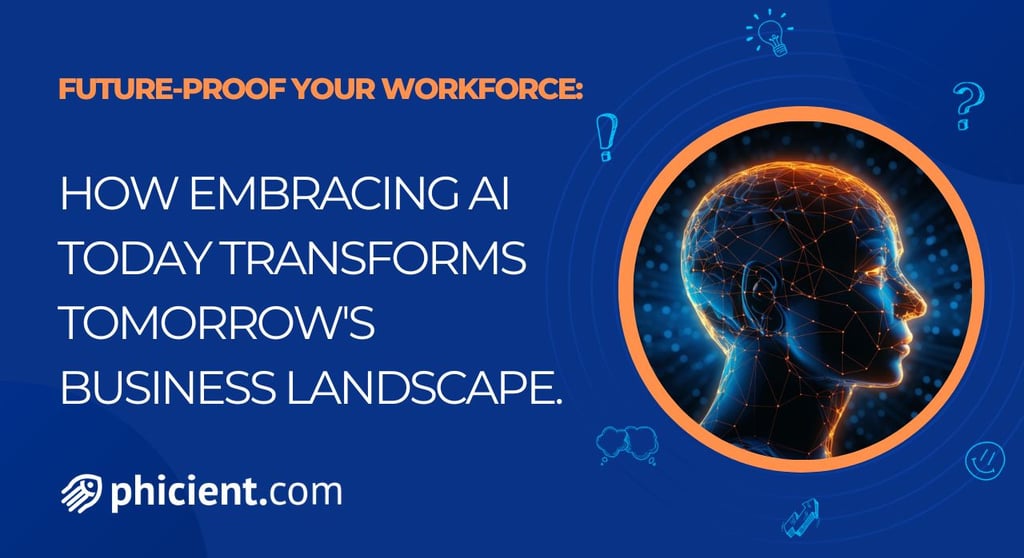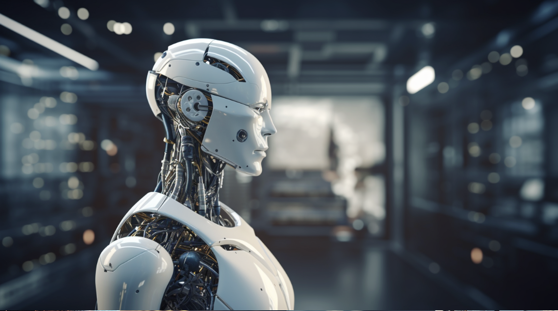How Embracing AI Today Transforms Tomorrow's Business Landscape
How embracing AI today is critical for shaping a future-ready workforce, addressing the challenges, ethical concerns, and opportunities AI presents in transforming job roles, skills, and human-machine collaboration
Tony Brown
3/3/20233 min read
The dawn of AI has ushered in a pivotal transformation in our work lives, transcending mere technological upgrades. This evolution redefines our daily professional routines, calling for a deeper understanding of AI's role in reshaping job functions, skill requirements, and human-machine collaboration.
This article delves into the profound impact of AI, beyond mere efficiency enhancements. It reveals how AI is revolutionizing skillsets, raising critical ethical concerns, and shaping a new frontier of job opportunities. Prepare to navigate this transformative journey!




Navigating Challenges and Seizing New Opportunities
While AI serves as a task enhancer, it also sparks fears of job redundancy and skill obsolescence. Viewing AI as a collaborator, not a replacement, urges a shift towards reskilling and hybrid roles that combine human ingenuity with AI's precision. In this context, the necessity for transparent AI decision-making becomes paramount, ensuring accountability in the face of errors or biases.
The integration of AI in workplaces presents a complex scenario, balancing technological progress with human-centric considerations. Critical issues include bias and fairness, workforce displacement, and accountability, all pivotal in harnessing AI's transformative potential.
Bias and Fairness: AI's susceptibility to inherent biases, due to reliance on historical data, poses a significant challenge. Addressing this requires meticulous examination of data sources, algorithm refinement, and diverse input in AI development, fostering equitable decision-making.
Workforce Displacement: AI's role in streamlining tasks raises concerns about job displacement. Viewing AI as an enhancer of human capabilities, rather than a full replacement, is essential. Emphasizing reskilling and the development of roles that merge human creativity with AI's efficiency is crucial in addressing these concerns.
Accountability in AI Decision-Making: The opaque nature of AI algorithms raises accountability issues. Establishing frameworks for transparency and oversight is essential to delineate responsibility and address potential biases or errors.
The Risks of Ignoring AI in the Workplace
Choosing not to integrate AI can lead to inefficient resource allocation, reduced competitiveness, and limited adaptability. The absence of AI in streamlining tasks and providing insights can hinder an organization's ability to respond to market changes and capitalize on emerging opportunities. This lack of agility can restrict growth and limit effective response strategies in dynamic markets.
Inefficient Resource Allocation: Without AI, organizations may expend excessive resources on manual tasks that AI could streamline, compromising competitiveness and stifling innovation.
Reduced Agility: Neglecting AI might result in diminished organizational agility, crucial in today's rapidly evolving markets. AI's ability to provide quick data analysis and adaptable strategies is vital for responsive market engagement.
Missed Opportunities: Forgoing AI means missing out on potential growth and innovation avenues. AI-driven insights can reveal hidden market patterns and enhance customer engagement, crucial for maintaining a competitive edge.


Training Essentials for Sustained AI Use in the Workplace
The journey into an AI-integrated workplace involves strategic training and continuous support. Key elements include nurturing a culture of lifelong learning, fostering adaptability, and promoting self-directed skill development, each vital for AI fluency.
Continuous Learning for AI Proficiency: Cultivating a culture of lifelong learning is critical. Encourage an ethos of ongoing skill and knowledge development, with leadership championing continuous education. An environment supportive of exploration and self-paced learning is key to adapting to AI advancements.
Adaptability and Flexibility: Instilling adaptability is vital for managing AI-induced changes. Encourage flexible approaches and strategies in AI implementation, viewing change as a growth opportunity rather than a disruption.
Self-Directed Skill Enhancement: Empower individuals to guide their AI learning journey. Facilitate access to resources for self-driven skill development, tailored to individual roles and aspirations. This approach fosters a proactive, evolving skillset aligned with AI advancements.
Incorporating these elements into organizational culture ensures a workforce that is adaptable, forward-thinking, and evolves alongside AI developments, positioning the organization for success in the dynamic AI landscape.
At Phicient, we recognize that AI integration is not solely about technology; it's about empowering your workforce. Our commitment extends to providing continuous support and training, fundamental to successful AI adoption. Discover how Phicient's services can help your business thrive in an AI-enhanced future.


